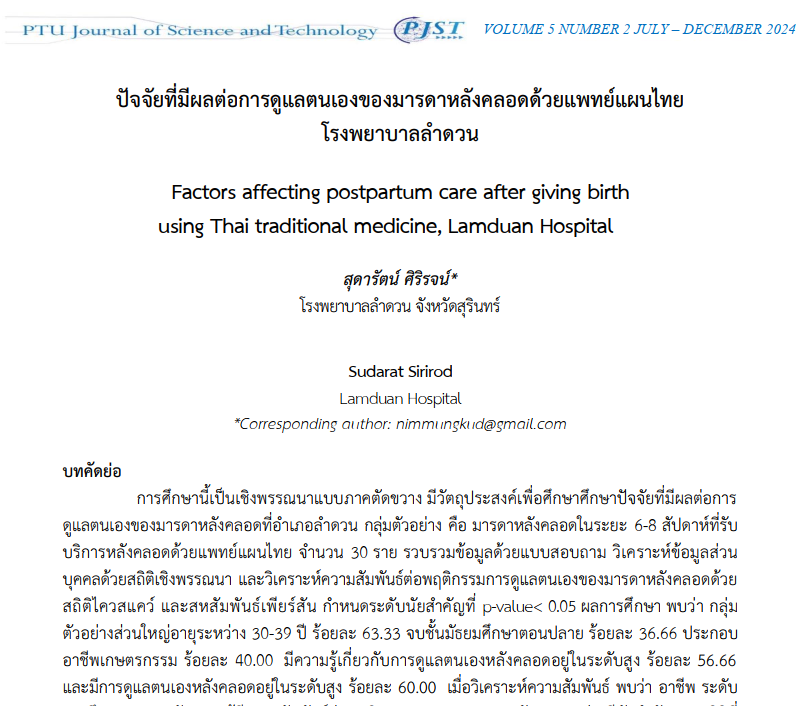Factors affecting postpartum care after giving birth using Thai traditional medicine, Lamduan Hospital
Main Article Content
Abstract
This study is a cross-sectional descriptive study aimed to examining the factors affecting the self-care of postpartum mothers utilizing traditional Thai medicine in Lamduan District. The sample consisted of 30 postpartum mothers who were between 6 to 8 weeks postpartum and had received postpartum care through traditional Thai medicine. Data were collected using a questionnaire, and general data were analyzed using descriptive statistics, while the relationships concerning the self-care behaviors of postpartum mothers were analyzed using the Chi-square and Pearson Correlation, the significance p=value< 0.05 The results indicated that the majority of the sample were aged between 30 -39 years in 63.33%, graduate in secondary level in 36.66%, and were agricultural in 40.00%. For the knowledge of postpartum self-care was found to be at a high level in 56.66%, and the self-care behaviors of postpartum were at high level in 60.00%. Additional to analyze relationships, it was found that occupation, education and knowledge level had a statistically significant correlation with self-care behaviors postpartum at a p-value < 0.05. Meanwhile, knowledge (r=0.584) and order of pregnancy (r=0.331) were significantly related to the self-care behaviors of postpartum women at a level of p-value<0.05
Article Details

This work is licensed under a Creative Commons Attribution-NonCommercial-NoDerivatives 4.0 International License.
ความคิดเห็นและข้อเสนอแนะใดๆ ที่นำเสนอในบทความเป็นของผู้เขียนแต่เพียงผู้เดียว โดยบรรณาธิการ กองบรรณาธิการ และคณะกรรมการวารสารวิทยาศาสตร์และเทคโนโลยี มหาวิทยาลัยปทุมธานี ไม่ได้มีส่วนเกี่ยวข้องแต่อย่างใด มหาวิทยาลัย บรรณาธิการ และกองบรรณาธิการจะไม่รับผิดชอบต่อข้อผิดพลาดหรือผลที่เกิดจากการใช้ข้อมูลที่ปรากฏในวารสารฉบับนี้
References
กรมการแพทย์แผนไทยและการแพทย์ทางเลือก. (2563). คู่มือการดูแลสุขภาพหลังคลอดด้วยแพทย์แผนไทย. นนทบุรี: กระทรวงสาธารณสุข.
คงเพชร ศรีสมพร. (2562). ปัจจัยที่มีผลต่อพฤติกรรมการดูแลตนเองในกลุ่มมารดาหลังคลอดในชนบท. วารสารสุขภาพชุมชน, 5(3), 89-105.
จารุภา วงศ์ช่างหล่อ ปภัสรา วงศ์ศิริ และนิตยา วงศ์ทอง. (2560). ปัจจัยที่มีอิทธิพลต่อพฤติกรรมการจัดการตนเองและครอบครัวของมารดาหลังคลอดบุตรครรภ์แรก. วารสารพยาบาลเกื้อการุณย์, 24(1), 179–196.
บุญชม ศรีสะอาด. (2556). การแปลความหมายของคะแนนตามเกณฑ์. กรุงเทพฯ: สำนักพิมพ์แห่งจุฬาลงกรณ์มหาวิทยาลัย.
พนิดา มากนุษย์ นภาพร แสนพิมพ์ และสิริพร ล้วนดี, (2561). ประสิทธิผลของการทับหม้อเกลือด้วยศาสตร์แพทย์แผนไทยในหญิงหลังคลอด. วารสารวิทยาศาสตร์สุขภาพและการสาธารณสุขชุมชน, 1(1), 26-38.
พรพรรณ พุ่มประยูร พรรณี ไกรศร และสมจิต สงคราม. (2559). ผลของการเตรียมสตรีครรภ์แรกต่อความสำเร็จในการดำรงบทบาทมารดา. พยาบาลสาร มหาวิทยาลัยเชียงใหม่, 43(4), 33-43. https://doi.org/10.4314/jcn.v43i4.4
โรงพยาบาลลำดวน (2566). ข้อมูลบริการตรวจหลังคลอด ปี 2565-2566. กลุ่มงานบริการด้านปฐมภูมิและองค์รวม โรงพยาบาลลำดวน.
Anderson, R., Smith, L., & Johnson, P. (2020). Impact of educational attainment on postpartum self-care practices. Journal of Maternal Health Studies, 15(2), 112-123.
Baker, S., Martin, J., & Nguyen, A. (2018). The role of maternal education on postpartum care adherence. Global Health Research, 9(3), 67-75.
Best, J. W. (1981). Research in education (6th ed.). Englewood Cliffs, NJ: Prentice-Hall.
Brown, T., Williams, K., & Lee, S. (2018). Age-related readiness for postpartum health management. Women’s Health Journal, 21(4), 345-354.
Garcia, M., Chen, L., & Wu, Q. (2019). Socioeconomic factors influencing postpartum health behaviors. Health & Social Care Journal, 14(1), 97-105.
Jones, A., Taylor, M., & White, R. (2019). Previous pregnancy experience and postpartum self-care. Journal of Reproductive Health, 25(6), 251-258.
Krejcie, R. V., & Morgan, D. W. (1970). Determining sample size for research activities. Educational and Psychological Measurement, 30(3), 607–610. https://doi.org/10.1177/001316447003000308
Singh, V., Kumar, P., & Sharma, R. (2017). Agricultural occupation and its impact on maternal self-care practices. Rural Health Research, 12(2), 134-142.
Thorndike, R. M. (1991). Measurement and evaluation in psychology and education (5th ed.). New York, NY: Macmillan.


